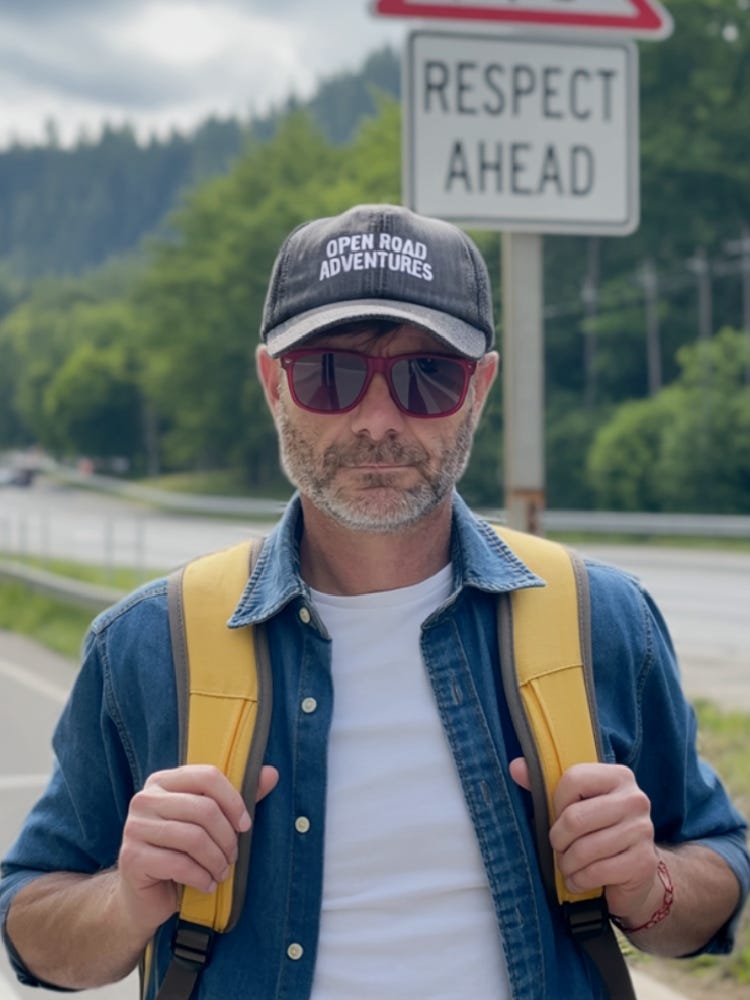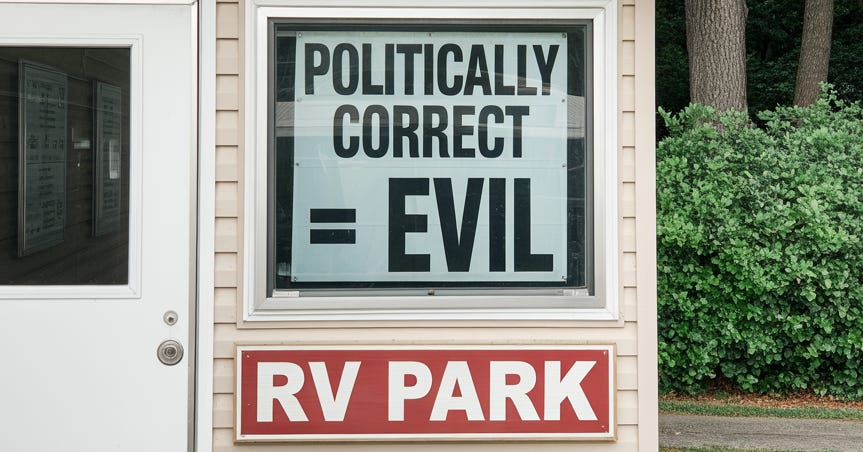One of the things I love about traveling is how the smallest, most unexpected moments can spark the biggest thoughts.
Yesterday, I was in Monticello, Minnesota, making a quick stop at an RV park to take advantage of one of the services they offer for my travel trailer. I pulled in, parked, and went into the office to pay. That’s when I saw it — a sign taped to the wall, bold letters staring back at me:
“Political Correct = Evil”
It made me pause. I know the term “politically correct” means different things to different people, and it often sparks strong reactions. But seeing it framed as evil made me want to stop and think about what it really means — at least to me.
According to the Oxford English Dictionary, “politically correct” means:
Avoiding forms of expression or action that are perceived to exclude, marginalize, or insult people who are socially disadvantaged or discriminated against.
That’s the official definition. But for me, it’s even simpler: it’s about everyday respect — the small, human choices that make people feel seen and valued.
Sometimes that’s calling someone by the name they introduce themselves with. Sometimes it’s using the pronouns a person identifies with. Sometimes it’s steering clear of jokes or phrases that rely on stereotypes. And sometimes it’s just listening long enough to understand how your words might land on someone else.
One of the clearest examples for me comes from my own name.
My legal name is Ronald. I hate being called Ronald. When I was a kid, I went by Ronnie. As an adult, I’ve always gone by Ron. That’s the name I introduce myself with. That’s the name I respond to.
If you call me Ronald after I’ve introduced myself as Ron, it doesn’t just feel wrong — it feels like you’re ignoring who I am. Like my preference didn’t matter enough for you to remember it.
I think most people can relate to that in some way. Maybe you have a nickname you prefer. Maybe there’s a version of your name you’ve never liked. Maybe you’ve changed your name completely. Whatever it is, you know how it feels when someone calls you something that doesn’t fit.
For me, that’s the heart of what political correctness is supposed to be — not a list of rules, not censorship, not walking on eggshells, but showing a basic level of care in how we treat each other.

The trouble is, the term “politically correct” puts the focus in the wrong place. The word political triggers division before the conversation even begins. People hear it and stop listening — not to the meaning, but to the label.
But if we drop the label and keep the principle, we might find we’re not as far apart as we think.
Because here’s the truth, at least as I see it: whether we’re talking about names, pronouns, cultural traditions, or everyday courtesy… almost everyone wants the same thing. To be treated with dignity. To be spoken to with care. To know they matter enough for someone to get it right.
And when you strip away all the noise, isn’t that just kindness?
Better Words for a Better Conversation?
If “politically correct” has too much baggage, here are a few words I can think of that carry the same spirit without the weight:
Respect – showing regard for someone’s dignity.
Kindness – choosing words and actions with care.
Courtesy – being polite and considerate.
Manners – the everyday ways we show thoughtfulness.
Tact – finding the right words for the moment.
Sensitivity – being mindful of how words might land on others.
None of these words are about politics. They’re about people. They’re about how we choose to move through the world and what we leave behind in the hearts of others.
When I walked out of that RV park office in Monticello, the sign was still there, the bold letters still staring back at me. The world outside hadn’t changed — same parking lot, same hum of the highway in the distance. But something in me had shifted.
I kept thinking about how easy it is for us to focus on the words themselves — the labels, the slogans, the arguments — and forget the people behind them. And I wondered how many times I’ve been guilty of doing the same.
If I could rewrite that sign, I’d keep it just as short, but I’d make it say something worth carrying down the road:
Kindness is never wasted.
Because no matter where we’re headed, we can all use more of that.
– R. Michael
These are the kinds of moments I find myself turning over long after they happen — the ones that seem small at the time but stick with me. I write about a lot of moments like that in Not That Anyone Asked, and I’d love to have you join me there.




Hi Ron: I agree with everything you wrote and enjoyed how you perceived the “sign” and broke it down. Sadly, not only our country but the entire world is so divided that we have lost sight of simple kindness and respect. I was raised by nuns and a strict German grandmother to always be respectful. The pronouns I was taught, Mr., Mrs, Miss ,Sir & Mam are the ones I still use today.
While it’s doubtful I’ll be adding to that list, I’m still respectful of the live & let live value system.
On another note, I too am a fairly new camper and travel with at least one and sometimes two
of my dogs. One is a great adventurer and loves to travel but the older one was anxious at first.
I doubled up dog beds to avoid bumps startling him as much and take more walks. I belong to Harvest Hosts to avoid crowded campgrounds and wonder what the difference or advantage is from Hipcamp? I pay an annual fee and then support the farm with purchases when I arrive. Cari